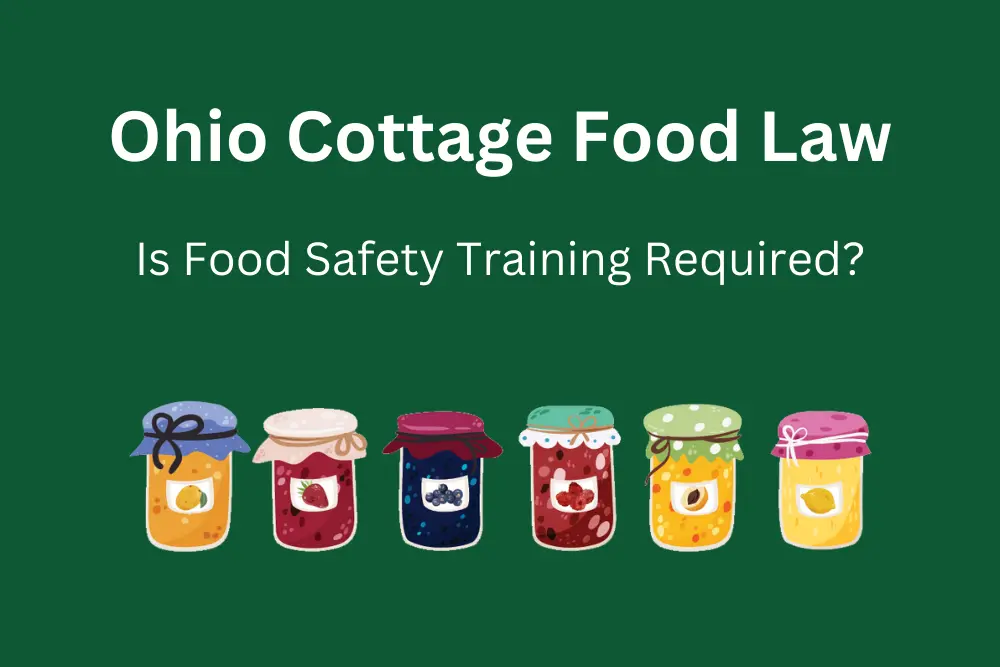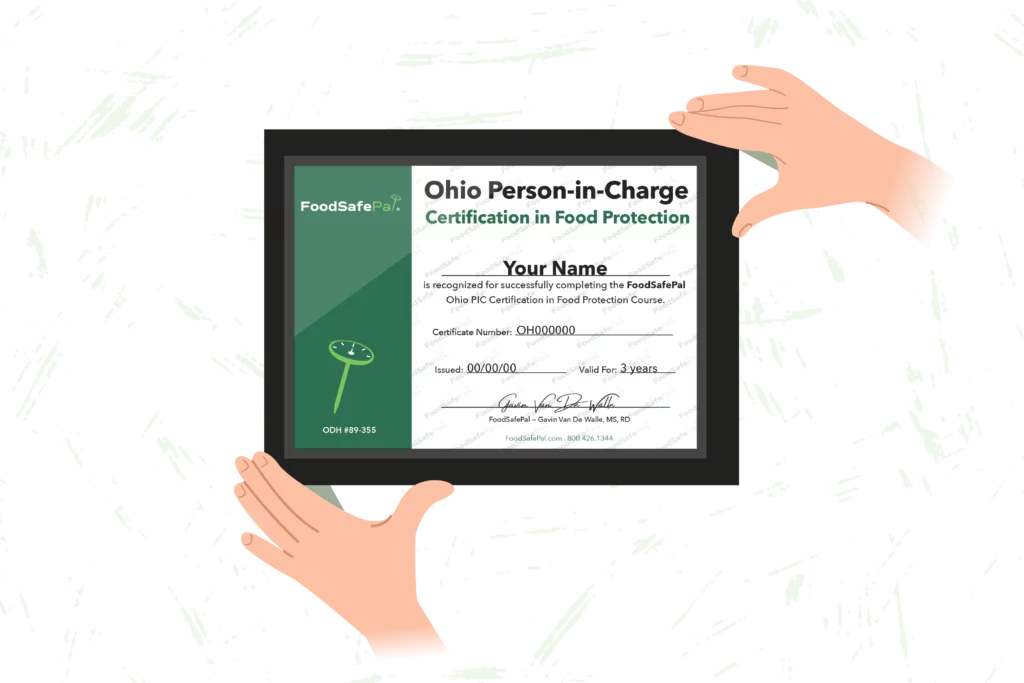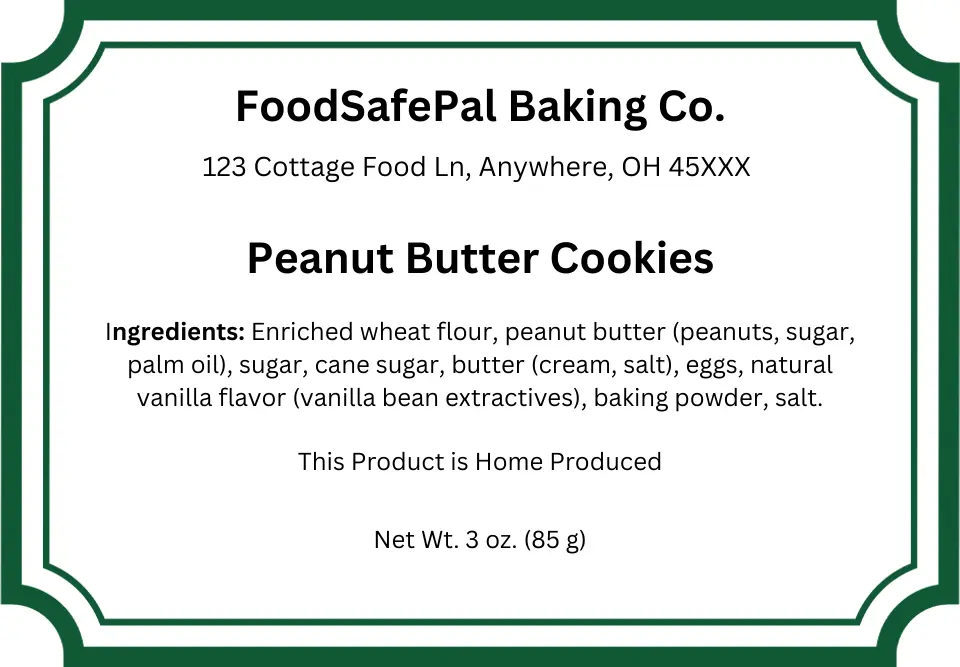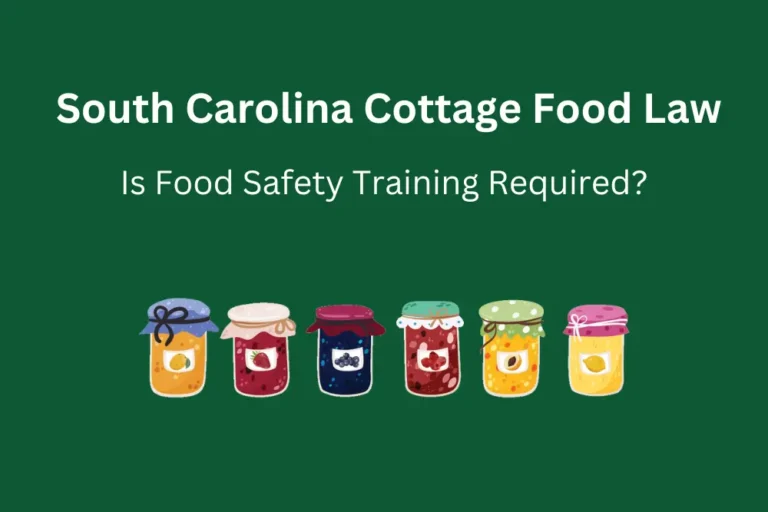Ohio Cottage Food Law: Do You Need Food Safety Training?
Food made for sale from a home kitchen is known as cottage food.
Each state has its own cottage food law, setting rules for what foods you can make and sell, how and to whom you can sell them, and how much you can earn annually from your homemade goods.
There are also rules about food safety training to ensure the food you make doesn’t make people sick.
This article discusses the Ohio cottage food law, and whether you need food safety training to sell homemade food.

Ohio cottage food production
Ohio’s cottage food law allows you to make and sell homemade goods that don’t require time or temperature controls to keep them safe.
Here are examples of approved foods:
- baked goods (that don’t require refrigeration)
- candy
- fruit jams and jellies
- flavored honey made by an exempt beekeeper
- fruit chutneys (non-acidified)
- fruit butters
- granola and granola bars dipped in candy
- maple sugar produced by an exempt maple syrup producer
- popcorn, including flavored, kettle corn, balls, and caramel corn
- unfilled baked donuts
- waffle cones and waffle cones dipped in candy
- pizzelles
- dry cereal and nut snack mixes with seasonings
- roasted coffee (whole beans or ground)
- dry baking mixes, herbs, teas, soups, and seasoning blends
In contrast, you cannot make and sell foods that require time or temperature controls to keep them safe, such as cheesecake, salsa, and cream cheese frosting under Ohio’s cottage food law, unless you have a home bakery license.
Ohio requires that you sell your goods directly to people in the state from your home, but you can also sell through grocery stores, registered farm markets, and festivals or celebrations that last seven days or fewer. You can also sell your goods to be used for food preparation in a restaurant.
Because the Ohio Department of Agriculture doesn’t regulate cottage food operations like traditional food establishments, your home kitchen won’t be routinely inspected — unless you have a home bakery license.
However, Ohio may sample your product to determine whether it’s misbranded or contains an unallowed or unsafe ingredient.
Do you need food safety training to sell homemade food in Ohio?
Because Ohio doesn’t regulate cottage food businesses like it does restaurants and food trucks, the state doesn’t require any type of food safety training to operate.
While Ohio may not require food safety certification for cottage food operators and home bakeries, having one sets you apart in a meaningful way.
Why? Because trust sells.
When someone buys from you, they want to feel confident that the food they’re bringing home was made and handled safely. They want to enjoy it with their family without worrying about foodborne illness. A food safety certification reassures your customers that you take their health — and your business — seriously.
Beyond customer trust, having a food safety certification can open doors that might otherwise be closed. Some farmers markets, pop-up events, and even wholesale buyers, like restaurants or coffee shops, may require vendors to show proof of food safety training for both their protection and yours.
Insurance providers may also play a role. Some require food safety training before issuing a policy, while others may offer discounts to certified operators. Having certification can not only make it easier to get but also potentially save you money in the long run.
Of course, not all food safety training is created equal. Ohio recognizes the Person in Charge Certification in Food Protection, which is required for restaurants, food trucks, and other licensed food establishments. While this certification covers some material that may not apply to you as a cottage food operator, it still teaches fundamental food safety principles—helping you prevent contamination, handle food safely, and protect your customers.

Get Your Ohio Person-in-Charge Certification in Food Protection
No Final Exam. Certification Guaranteed.
At the end of the day, having food safety certification isn’t just about meeting requirements — it’s about demonstrating your commitment to safe, high-quality food that customers can trust. And that trust? It’s one of the most valuable ingredients in your business’s success.
Labeling requirements
Ohio’s cottage food law requires that each product you sell be properly labeled with certain information to allow your customers to contact you in the case of an illness that may be linked with your product.
These labeling requirements also inform consumers of any major food allergens your product may contain and indicate that the product was made in a home not subject to regular inspection by the health department.
Your label must include the following information:
- name of the product
- net quantity of contents (weight in both inch-pound and metric system)
- ingredients listed in descending order of predominance by weight
- name and address of your business
- the statement “This Product is Home Produced,” in ten-point type
If you make any nutrient or health claims, they must meet the Food and Drug Administration’s labeling requirements.

The bottom line
Under Ohio’s cottage food law, you can make and sell foods that don’t require time and temperature controls to keep them safe — such as certain baked goods and other dry goods — throughout the state.
You can sell time and temperature controlled for safety foods with a bakery license.
Ohio does not require food safety training to operate a cottage food business, but earning Ohio’s recognized Person in Charge Certification in Food Protection helps you build customer trust, access more selling opportunities, meet potential insurance requirements, and demonstrate your commitment to producing safe, high-quality food.
Each product you sell must include the required label information.

Get Your Ohio Person-in-Charge Certification in Food Protection
No Final Exam. Certification Guaranteed.






